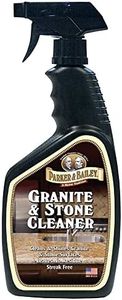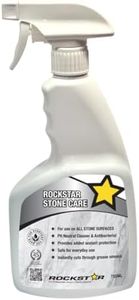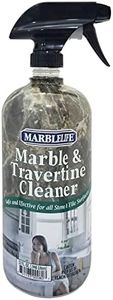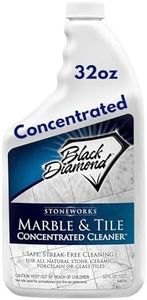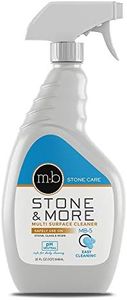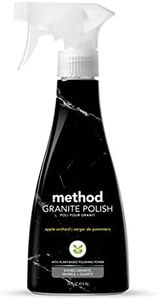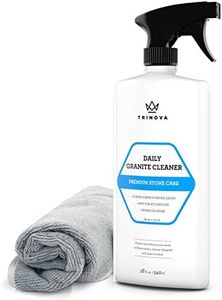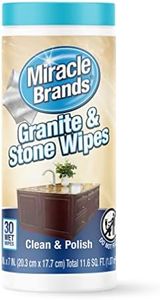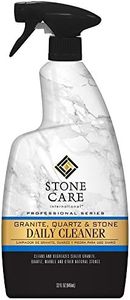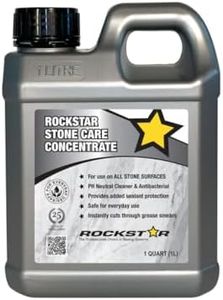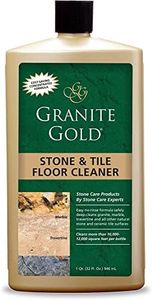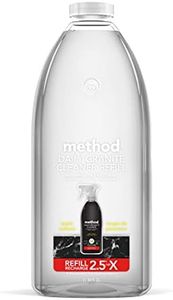We Use CookiesWe use cookies to enhance the security, performance,
functionality and for analytical and promotional activities. By continuing to browse this site you
are agreeing to our privacy policy
10 Best Marble Cleaners
From leading brands and best sellers available on the web.By clicking on a link to a third party's website, log data is shared with that third party.
Buying Guide for the Best Marble Cleaners
Choosing the right marble cleaner is essential to maintain the beauty and longevity of your marble surfaces. Marble is a delicate natural stone, and using the wrong cleaner can cause damage such as etching, dullness, or discoloration. When selecting a marble cleaner, it's important to consider how often you'll use it, the type of marble you have, and the area you need to clean—for example, kitchen countertops, bathroom floors, or decorative tables. Understanding the specific needs of your marble will help you make a safe and effective choice.pH LevelThe pH level of a marble cleaner indicates how acidic or alkaline it is. Marble is sensitive to acidic or highly alkaline substances, which can etch or dull the surface. Ideally, you want a neutral pH (around 7) cleaner, which is gentle and safe for regular use. Cleaners advertised as 'marble-safe' or 'stone-safe' are typically pH-neutral. If you’re cleaning kitchen or bathroom counters that get frequent use, always pick a neutral pH cleaner to avoid long-term damage. For those dealing with tough stains, resist the urge to use harsher acidic solutions, and instead opt for methods specifically designed for stains on marble.
Type (Spray, Liquid, Wipes, Powder)Marble cleaners come in several forms such as sprays, liquids, wipes, and powders. Sprays are convenient for everyday cleaning and quick touch-ups. Liquids typically cover larger areas and can be used with a mop for floors. Wipes are handy for small surfaces or for quick cleaning on countertops or tables. Powders are less common and generally used for more targeted cleaning or polishing. Choose sprays or wipes for convenience in bathrooms and kitchens; opt for liquids if you’re handling marble floors or large expanses. Pick the form that best matches your cleaning habits and the areas you most often maintain.
IngredientsThe ingredients in a marble cleaner are critical for both stone safety and user health. Look for formulas that are free of acidic substances like vinegar, lemon, or strong chemicals like bleach and ammonia, which can harm marble. Natural or plant-based cleaners are often milder, but always check that they state 'marble safe.' If you're sensitive to fragrances or allergens, select fragrance-free or hypoallergenic options. The right ingredient list depends on your surface (especially in areas like kitchen counters, where food contact might occur) and on your own preferences for scent and harshness.
Usage (Daily vs. Deep Cleaning)Some marble cleaners are designed for daily maintenance, while others are intended for monthly or deep cleaning. Daily cleaners are gentler and suitable for routine wiping to prevent dullness and buildup. Deep cleaning products may be stronger but should be used less frequently to avoid surface damage. Decide based on your cleaning schedule: if you clean surfaces regularly, a daily-use cleaner is best; for occasional intensive cleaning sessions, look for products specifically marked for deep or heavy-duty cleaning and always follow the usage recommendations.
Residue and StreakingA marble cleaner’s ability to rinse clean without leaving residue or streaks is important for a shiny, attractive finish. Some cleaners can leave a film that dulls the marble or causes streaking. If you’re cleaning high-visibility areas like kitchen counters or marble tables, select a cleaner known for a residue-free finish. For large floor areas, look for products that claim to be streak-free for a consistent sheen. This is especially crucial in brightly lit rooms where smudges and streaks show more clearly—so consider your home’s lighting and use bright areas as a guide.

